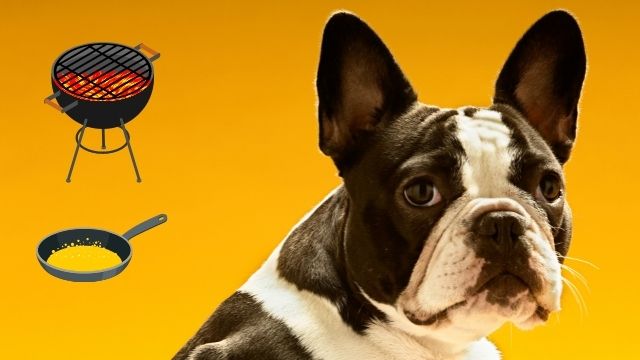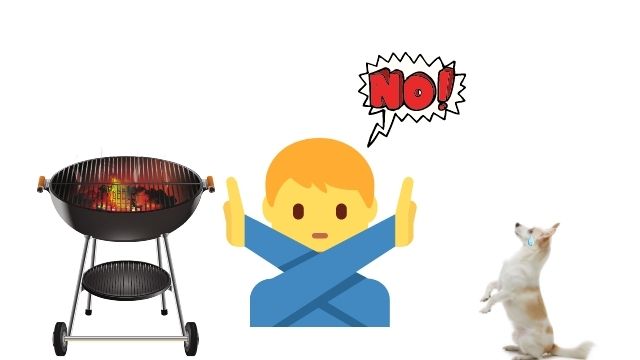Dogs are known for their tendency to steal foods from counters, plates, and even fridges. But what happens when a dog decides to treat itself with some grease from the grill. This is something many owners have experienced.
Dog ate grease from the grill – what now? Suppose your dog ate grease from the grill. In that case, it is expected to develop a certain level of stomach upset manifested with vomiting and diarrhea. However, in more severe cases, a pancreatitis episode can occur as well. Therefore, it is best advised to seek veterinary attention as soon as the incident occurs.
In this article, we will talk about how grease-eating accidents, the dangers of fats for dogs, and what you need to expect after your dog cleans the grill from the grease. Finally, we will discuss the right course of action and when it is time to call the vet.
What To Do If Your Dog Eats Grill Grease?
If your dog ate grease, call your trusted veterinarian and explain what happened. The vet will decide what is best based on several factors, including your dog’s age, size, ongoing health issues, and the amount of grease consumed.
Generally speaking, there are two options:
- Option number 1: Monitor the dog at home while feeding a bland diet and ensure the dog stays properly hydrated.
- Option number 2: Go to the vet’s office and stabilize the dog using medications and appropriate supportive therapy.
The first option is recommended when a large dog eats a smaller amount of grease and does not show any upsetting signs. The second option is advisable for small dogs with huge appetites and dogs already exhibiting signs of tummy troubles.
What Happens If A Dog Eats Grease From The Grill?
What happens after a dog eats grease depends mostly on two factors – the dog’s size and the grease’s amount. Obviously, the prognosis is better for large dogs that took a few small licks than for smaller dogs that ate a mouthful of grease.
Scenario number 1: Digestive upset
This is something every dog experiences at least once in its lifetime. Most digestive upsets are transient and, if not too severe, can be managed at home. Basically, a dog with an upset tummy will vomit, have diarrhea, abdominal pain, and refuse to eat. These signs will resolve as soon as the stomach gets rid of the irritant.
Scenario number 2: Pancreatitis
This is a serious situation. Eating too much fat at once can culminate in acute pancreatitis – sudden and very painful inflammation of the pancreas. From a clinical standpoint, the signs and symptoms are similar to in dogs with stomach upsets. However, a simple biochemistry panel is enough to make a differential diagnosis.
Scenario number 3: Burns on the face and paws
This is not a very likely scenario, but it is definitely possible and worth mentioning. A dog stealing grease from the grill may experience burns on its paws, face, or even tongue if the grill is still hot. This is because when attracted by the delicious grease smell, a dog may not notice it is getting too close to a burning surface.
Why Do Dogs Eat Grill Grease?
Dogs do not have very picky eating standards and are willing to eat just about anything. And when that anything smells like bacon grease or some other meaty delicacy, the feast is even bigger.
There are several scenarios in which dogs can get access to grease and end up eating it:
- Scenario number 1: Dog eats grease directly from the grill – most grills are designed specifically with a special container for collecting the grease. A dog attracted by the smell of the content on the grill is likely to enjoy the grease from the container.
- Scenario number 2: Dog steals grease from the trash can – another option would be if you cleaned the grease from the container and tossed it in the trash can. Then, if using a non-dog-proofed trash can, your dog may raid the trash can and steal the nice-smelling content.
- Scenario number 3: The owner feeds grease purposely without knowing it is bad – this may seem unusual but can be quite common. Many dog owners are unaware of the dangers of fat and assume that animal-sourced fat is a good food option for dogs.
Which Greases Are Bad For Dogs?

Basically, all grease types are bad when eaten in excess amounts or too frequently. This concept is not just for dogs; it also applies to humans.
Also, not all greasy foods are actual fats; for example, chicken skin is high in fats and is likely to produce grease when put on the grill. To make things easier to understand, let’s take a closer look at the different types of fats.
Type number 1: Animal fats
The first group of fats is sourced from animals and include the following foods:
- Meat skins (chicken skin, turkey skin, pork skin)
- Meat-linked fats (pork fat, duck fat, lamb fat)
- Beef grease, bacon grease, Meat drippings, and meat scraps.
Type number 2: Other fats
The second group of fats is sourced from plants and milk and includes the following foods:
- Margarine, butter, lard, and shortening
- Cooking oils (vegetable oil, coconut oil, olive oil, avocado oil, flaxseed oil)
- Certain high-fat dairy foods (sour cream, cheese, whole milk)
My Dog Ate Grill Grease And Is Throwing Up
This is the most likely scenario after eating not just grease but anything that is not actually edible. In such cases, throwing up is a good thing, especially at the beginning.
Namely, when the dog’s tummy feels burdened and upset, its first response would be to remove the harmful agent (in this scenario, the grease). And what is a better way of getting rid of the grease than throwing it up?
Therefore, when a dog vomits after eating grease, it is inadvisable to give anti-vomiting medications during the early phases of the stomach upset episode. However, vomiting management is recommended if the vomiting persists after 24 to 48 hours of the grease-eating incident.
Which medication will be used to manage the vomiting depends on the overall situation and is something you should discuss with the vet.
Dog Shaking After Eating Grease From The Grill
It is not uncommon for dogs to start shaking soon after eating. In fact, some dogs can start shaking when they overeat on dog food while others after eating something they were not supposed to (this should not be confused with shaking or seizures after eating toxic chemicals).
Another reason for a dog to be shaking after eating grease is if it develops severe tummy upset or pancreatitis. In both cases, the overall clinical manifestation can be accompanied by increased body temperature or fever. A dog with a fever is likely to shake and shiver simply because it feels cold.
How Can I Prevent My Dog From Eating Grill Grease?

Not every scenario is preventable – dogs can be deceiving and mischievous, and accidents take only a second to occur. However, there are several things you can do to minimize your dog’s chances of getting its teeth and tongue on juicy grease.
Tip number 1: Do not leave the grill unsupervised
This applies to more than the grill – when parenting a dog, you must not leave anything unsupervised – the table, the countertop, the washing sink. Basically, you need to limit your dog’s access to grease but keep it out of reach.
When grilling food, you need to be extra careful because, as already mentioned, if attracted by the smell, the dog may act irrationally and accidentally end up burning itself from the hot grill.
Tip number 2: Properly dispose of the grease
When you are a dog parent, you need to properly pet-proof the house. Considering the dog’s fondness for raiding trash cans, we strongly recommend using dog-proof trash cans your dog cannot open.
Alternatively, never dispose of the grease in regular trash as the scent will attract your dog and provoke accidents. Instead, just pack the grease in several bags and throw it directly into the outside garbage.
Tip number 3: Never feed your dog table scraps
If you did not know grease was bad before, now you are well aware of the dangers it poses. However, as mentioned, not all high-fat foods are in the form of grease. For example, table scraps (probably your dog’s favorite food) are actually quite greasy and hazardous.
Therefore, you must never give your dog table scraps. In fact, when it comes to feeding your dog, it is best advised to stick to regular dog food and occasionally use certain dog-friendly human foods such as small chunks of veggies and fruits.
SUMMING UP: DOG ATE GREASE FROM GRILL
A dog eating grease from the grill is a tricky situation that rarely ends up free from consequences. In most cases, dogs eating grease develop digestive upsets and even pancreatitis in more severe cases. Finally, some dogs will get burnt when stealing the grease.
All in all, considering the severity of the consequences that can stem from eating grease, it is best advised to keep a close eye on your dog when cooking with grease. Prevention is always much easier than managing adverse reactions.

